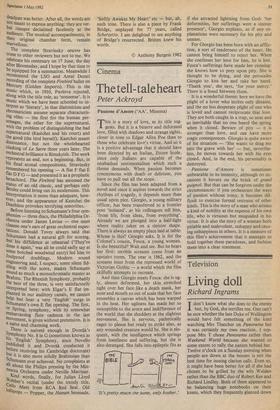Cinema
The tell-tale heart
Peter Ackroyd
Passione d'Amore (`AA', Minema) This is a story of love, as its title sug- gests. But it is a bizarre and deformed love, filled with shadows and strange sights, closer in tone to Edgar Allen Poe than to those who celebrate love's virtue. And so it is a positive advantage that it should have been directed by an Italian, Ettore Scole, since only Italians are capable of the unabashed sentimentalism which such a theme demands. When passion becomes synonymous with death or delirium, you have to pull out all the stops.
Since the film has been adapted from a novel and since it aspires towards the strict rhythms of tragedy, it depends more than usual upon plot. Giorgio, a young military officer, has been transferred to a frontier post 'isolated', as his colleagues tell him, `from life, from ideas, from everything'. Already we are plunged into a half-light where reality takes on a sinister shape. There is always an empty place laid at table: Whose is this? Giorgio asks. It is for the Colonel's cousin, Fosca, a young woman. Is she beautiful? Wait and see. But he hears her first: terrible screams come from an upstairs room. The year is 1862, and the screams issue from the repressed world of Victorian Gothic — a world which the film skilfully attempts to recreate.
And then Giorgio meets Fosca: she is ug- ly, almost deformed, her skin stretched tight over her face like a death mask, her nose and mouth so out of scale that her face resembles a canvas which has been warped in the heat. Her ugliness has made her so susceptible to the scorn and indifference of the world that she shudders at the slightest movement. She is nervous, pathetically eager to please but ready to strike also, as any wounded creature would be. She is elo- quent, with the intelligence which springs from loneliness and suffering, but she is also deranged. She falls into epileptic fits as `It's pretty much tne same, only kosher.' if she attracted lightning from God: `her deformities, her sufferings were a sinister presence', Giorgio explains, as if any ex- planations were necessary for his pity and unease.
For Giorgio has been born with an afflic- tion, a sort of tenderness of the heart. He cannot bring himself to reject her. When she confesses her love for him, he is lost. Fosca's sufferings have made her cunning: she knows how to prey upon pity. She is thought to be dying, and she persuades Giorgio to kiss her and take her hand. `Thank you', she says, `for your mercy.' There is a bond between them.
It is a wonderful theme: here we have the plight of a lover who incites only distaste, and the no less desperate plight of one who is loved and cannot reciprocate that love. They are both caught in a trap, so neat and so inevitable that no one heard the spring when it closed. Beware of pity — it is stronger than love, and can have more tragic consequences. Giorgio is quite aware of his situation — `She wants to drag me into the grave with her' — but, neverthe- less, he moves towards her with his eyes closed. And, in the end, his personality is destroyed.
Passione d'Amore is sometimes unbearable in its intensity, although on oc- casions it hovers on the brink of grand guignol. But that can be forgiven under the circumstances: if you orchestrate the ways of passion without irony, it becomes dif- ficult to exercise formal restraint of other kinds. This is the story of a man who attains a kind of nobility at the expense of his own life, who is virtuous but misguided in his virtue. It is also the story of a woman both pitiable and malevolent, unhappy and caus- ing unhappiness in others. It is a measure of this film's achievement that it manages to hold together these paradoxes, and fashion them into a clear statement.






































 Previous page
Previous page